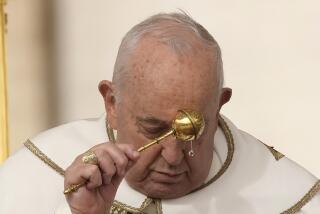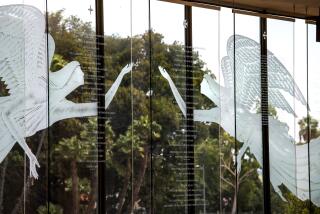Happy Coincidence
- Share via
For the first time in five years, Eastern Orthodox and Western Christian churches celebrate Easter today on the same date, thanks to a mathematical coincidence that has temporarily masked centuries of disagreement over when to observe the Resurrection.
Many Christians in both traditions began making their way to Easter services Saturday night and early this morning, proclaiming in hundreds of languages and differing liturgies their shared belief that Jesus rose from the dead.
Marking the first Easter of Christianity’s third millennium, today’s celebrations have rekindled interest--and raised old concerns--about setting a common date for the holiday. In some years--1983, for example--Eastern and Western observances have been more than a month apart.
That may not matter for many Southern California churchgoers. The biggest problem they face could be finding a parking space in areas where neighboring Orthodox and Western churches are drawing worshipers at the same time.
“Instead of looking for the empty tomb, they’ll be looking for an empty parking place,” quipped the Very Rev. John Bakas, dean of St. Sophia Greek Orthodox Cathedral, which is next door to St. Thomas the Apostle Catholic Church near Normandie Avenue and Pico Boulevard in Los Angeles.
But, on a more serious note, Bakas and other church leaders say more is at stake. The disagreement over when to observe Easter has been a painful reminder of other divisions. If Christians cannot agree on a date for Easter, they fear, their shared “witness” to the world will be compromised.
“Jesus prayed at the Last Supper that all of his followers might be one even as he and his Father were one, so it’s really tragic when all of his followers cannot celebrate the greatest event in Christianity, his Resurrection, on the same day,” said Father Alexei Smith, director of ecumenical and interreligious affairs for the Roman Catholic Archdiocese of Los Angeles.
No observance, including Christmas, is more central--or more defining of Christian belief--than Easter. Christians believe that Jesus was the Son of God, crucified by Roman authorities almost 2,000 years ago in Jerusalem. Three days later, he rose from the dead, and anyone who believes in him will have eternal life, they believe.
“Hristos anesti! Alithos anesti--Christ is risen! Truly he has risen!” Greek Orthodox faithful declared just after midnight this morning.
The refrain was similar in many Roman Catholic and Protestant churches: “The Lord is risen! The Lord has risen indeed!”
Yet for centuries, Eastern Orthodox and Western churches have disagreed over when to observe Easter.
Both start with the same rule: Easter falls on the first Sunday after the first full moon after the spring equinox. This is the rule set by the Council of Nicaea in AD 325.
But after Western churches abandoned the Julian calendar in 1582 in favor of the new and more accurate Gregorian calendar, the dates identifying the equinox and full moon after it began to differ.
Today, the Julian calendar, still used by many Orthodox churches, is 13 days behind the Gregorian calendar. In calculating when Easter falls, Orthodoxy takes the Julian calendar into account but also figures in a separate astronomical calculation.
The differences would not be nearly as great except for an Orthodox practice that Easter must follow Passover because Gospel accounts report the Resurrection following that Jewish holiday. Passover itself changes from year to year on the modern calendar. But the “after Passover” practice is not followed by Western churches.
This year, however, the Gregorian calendar used by Western churches, as well as the Orthodox calculation, led to Easter being today, while the Western date for the holiday unintentionally follows Passover.
Most clergy are unlikely to make a point of the confluence of Easter observances, said several local pastors, some of whom were not aware of the circumstances themselves.
But for Father Simeon B. Corona, pastor of St. Matthew Antiochian Orthodox Church in Torrance, the joint observances will at least be personally convenient, because he has Protestant relatives. “This time we can celebrate together,” he said.
In the case of Christmas, most Orthodox churches in the West celebrate Dec. 25, the same as non-Orthodox churches. But others, including the Russian and Serbian Orthodox churches, observe the holiday a week later.
On Easter, there have been attempts over the years to reach agreement. Pope Paul VI, Pope John Paul II and the Ecumenical Patriarchate--the spiritual center of Eastern Orthodoxy in Istanbul--have discussed the issue, but without reaching an agreement.
More recently, there has been renewed discussion of using neither a purely Western nor Eastern formula to set a date for Easter. Instead, the spring equinox would be calculated by “the most accurate possible scientific means,” using the meridian of Jerusalem as the basis.
But both sides realize that a mathematical formula is not the real issue. For one thing, tradition dies hard.
Among the Orthodox, for example, there has been concern that changing the date for Easter, however justified it might be on astronomical and canonical terms, “could result in creating confusion, divisions, and possibly schisms among the Orthodox,” according to “A Dictionary of Greek Orthodoxy,” published by that church.
In addition, since the fall of communism, tensions--unrelated to Easter--between self-governing Orthodox churches, such as the Russian Orthodox, and Roman Catholicism have made progress on a range of other issues difficult.
“In the background is the deep trauma in the East, caused by some attitudes of the West throughout history, which has resulted in a deeply rooted anti-Western suspicion,” the Rev. Dagmar Heller of the Evangelical Church in Germany said in a recent commentary for the World Council of Churches.
Until such issues are resolved, the only time Orthodox and Western Christians will celebrate Easter on the same day is by coincidence, as in 2004, 2007, 2010, 2011, 2014 and 2017.
“It’s an open issue,” said Archbishop Demetrios, head of the Greek Orthodox Church in the United States. “Who is not going to agree [that] a common celebration is not going to be a positive thing? The more we agree, the better is our witness. The only problem is how you do that without causing further problems.”
More to Read
Sign up for Essential California
The most important California stories and recommendations in your inbox every morning.
You may occasionally receive promotional content from the Los Angeles Times.













